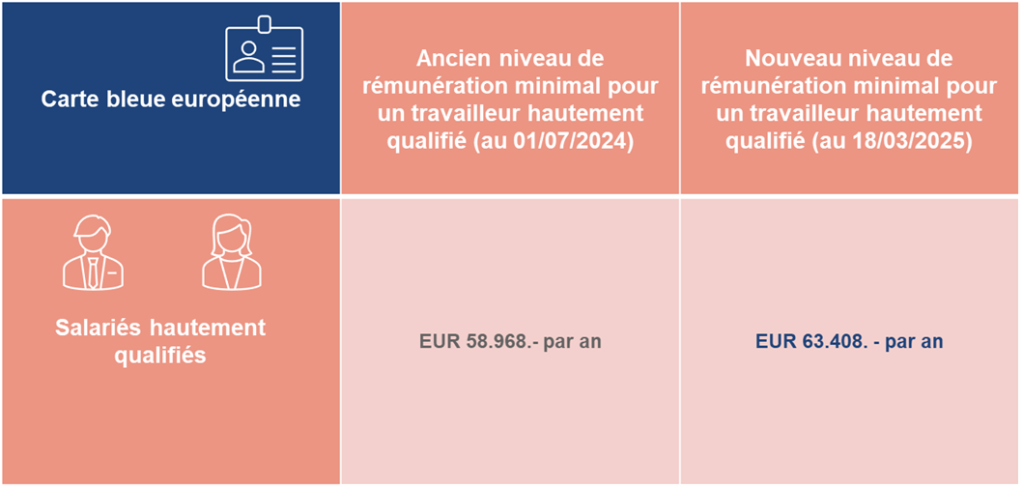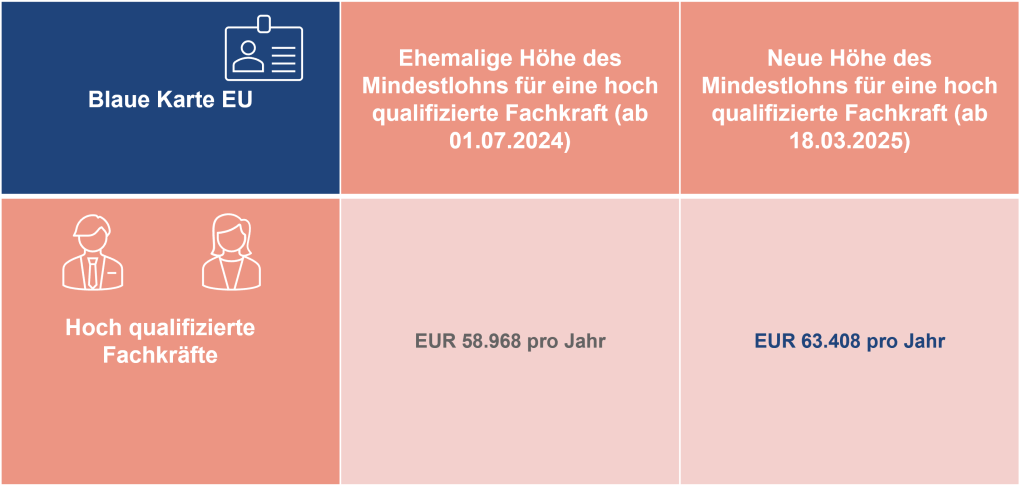EU Blue Card: increase of minimum salary threshold
The minimum annual salary needed to hire highly qualified third-country workers in Luxembourg has increased with effect from 18 March 2025.
In June 2024, Luxembourg significantly reduced the required minimum salary level for highly qualified third-country workers wishing to come and work in Luxembourg to be able to obtain an EU Blue Card, in order to attract more foreign talent to the country.
The Ministerial regulation of 6 March 2025[1], published on 14 March 2025, increases this minimum salary threshold to EUR 63,408 per year.
The new threshold applicable as from 18 March 2025 is as follows:

In addition to this level of remuneration, to be considered a highly qualified worker, a third-country national must have an employment contract with a minimum duration of six months. They must also have the higher professional qualifications required to exercise their non-regulated profession or fulfil the conditions required to exercise a regulated profession, as detailed in the employment contract.
Author: Raphaëlle Carpentier
1Ministerial regulation of 6 March 2025 setting the average gross annual salary as defined by the amended Grand Ducal regulation of 26 September 2008 determining the minimum salary level for a highly qualified worker in application of the law of 29 August 2008 on the free movement of persons and immigration.

How we can help
Contact our Employment Law, Pensions & Benefits team for tailored advice on how these changes may affect your recruitment and immigration strategy or for any help with regard to recruiting third-country nationals.
Carte bleue européenne : augmentation du seuil de rémunération minimal
En juin 2024, pour attirer davantage de talents étrangers au Luxembourg, le législateur luxembourgeois a significativement réduit le niveau de rémunération minimum requis pour que les travailleurs hautement qualifiés ressortissants de pays tiers souhaitant venir travailler au Luxembourg puissent obtenir une carte bleue européenne.
Le règlement ministériel du 6 mars 2025[1], publié le 14 mars 2025, augmente ce seuil de rémunération minimale à 63.408 EUR par an.
Le nouveau seuil applicable à compter du 18 mars 2025 est le suivant :

Outre ce niveau de rémunération, pour être considéré comme travailleur hautement qualifié, le ressortissant de pays tiers doit être en possession d’un contrat de travail d’une durée minimale de six mois. Il doit également posséder les qualifications professionnelles élevées requises pour exercer la profession non réglementée, ou satisfaire aux conditions requises pour l’exercice de la profession réglementée, telle que mentionnée dans le contrat de travail.
1Règlement ministériel du 6 mars 2025 fixant le salaire annuel brut moyen au titre du règlement grand-ducal modifié du 26 septembre 2008 déterminant le niveau de rémunération minimal pour un travailleur hautement qualifié en exécution de la loi du 29 août 2008 sur la libre circulation des personnes et l’immigration.
Author: Raphaëlle Carpentier

How we can help
Consultez notre équipe Employment, Pensions & Benefits pour des conseils personnalisés sur la manière dont ces changements peuvent affecter votre stratégie de recrutement et d’immigration ou pour toute assistance concernant le recrutement de ressortissants de pays tiers.
Grenzüberschreitende Vorhaben: Welche Neuerungen gibt es im Arbeitsrecht?
Um mehr ausländische Talente anziehen zu können, senkte der luxemburgische Gesetzgeber im Juni 2024 die Mindestlohnhöhe deutlich, die hochqualifizierte Arbeitskräfte aus Drittstaaten, die in Luxemburg arbeiten möchten, für eine Blaue Karte EU benötigen.
Die Ministerialverordnung vom 6. März 2025 [1], veröffentlicht am 14. März 2025, erhöht die Mindestlohnschwelle auf 63.408 EUR pro Jahr.
Ab dem 18. März 2025 gilt dementsprechend der folgende neue Schwellenwert:

Zusätzlich zu dieser Gehaltsschwelle muss ein Drittstaatsangehöriger, um als hochqualifizierter Arbeitnehmer zu gelten, einen Arbeitsvertrag mit einer Mindestdauer von sechs Monaten vorweisen können und über die hohen beruflichen Qualifikationen verfügen, die für die Ausübung des nicht reglementierten Berufs erforderlich sind, oder die Voraussetzungen für die Ausübung des reglementierten Berufs erfüllen, wie im Arbeitsvertrag angegeben.
1Ministerialverordnung vom 6. März 2025 zur Festlegung des jährlichen Bruttojahresgehalts gemäß der geänderten Großherzoglichen Verordnung vom 26. September 2008 zur Festsetzung der Mindestvergütung für hoch qualifizierte Arbeitnehmer in Anwendung des Gesetzes vom 29. August 2008 über den freien Personenverkehr und die Einwanderung.
Author: Raphaëlle Carpentier

How we can help
Sprechen Sie mit unserem Team Employment, Pensions & Benefits. Es berät Sie individuell darüber, wie sich diese Änderungen auf Ihre Einstellungs- und Einwanderungsstrategie auswirken können und unterstützt Sie bei der Einstellung von Drittstaatsangehörigen.
